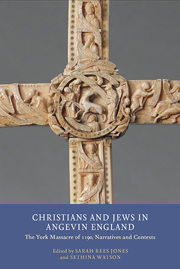Book contents
- Frontmatter
- Contents
- List of Illustrations
- Contributors
- Editor's Preface and Acknowledgments
- Abbreviations
- Introduction: The Moment and Memory of the York Massacre of 1190
- Part I The Events of March 1190
- Part II Jews among Christians in Medieval England
- 6 Faith, Fealty and Jewish ‘infideles’ in Twelfth-Century England
- 7 The ‘Archa’ System and its Legacy after 1194
- 8 Making Agreements, with or without Jews, in Medieval England and Normandy
- 9 An Ave Maria in Hebrew: the Transmission of Hebrew Learning from Jewish to Christian Scholars in Medieval England
- 10 The Talmudic Community of Thirteenth-Century England
- 11 Notions of Jewish Service in Twelfth- and Thirteenth-Century England
- Part III Representations
- Afterword: Violence, Memory and the Traumatic Middle Ages
- Bibliography
- Index
- York Medieval Press: Publications
6 - Faith, Fealty and Jewish ‘infideles’ in Twelfth-Century England
from Part II - Jews among Christians in Medieval England
Published online by Cambridge University Press: 05 May 2013
- Frontmatter
- Contents
- List of Illustrations
- Contributors
- Editor's Preface and Acknowledgments
- Abbreviations
- Introduction: The Moment and Memory of the York Massacre of 1190
- Part I The Events of March 1190
- Part II Jews among Christians in Medieval England
- 6 Faith, Fealty and Jewish ‘infideles’ in Twelfth-Century England
- 7 The ‘Archa’ System and its Legacy after 1194
- 8 Making Agreements, with or without Jews, in Medieval England and Normandy
- 9 An Ave Maria in Hebrew: the Transmission of Hebrew Learning from Jewish to Christian Scholars in Medieval England
- 10 The Talmudic Community of Thirteenth-Century England
- 11 Notions of Jewish Service in Twelfth- and Thirteenth-Century England
- Part III Representations
- Afterword: Violence, Memory and the Traumatic Middle Ages
- Bibliography
- Index
- York Medieval Press: Publications
Summary
The 1190 events in York make a powerfully moving tale, especially when recounted by thoughtful and articulate Yorkshiremen like William of Newburgh and Barrie Dobson. Nothing remotely comparable in savagery had previously occurred in this first century of the medieval English Jewry. Every historian experiences a kind of pull to see this as a watershed moment in the limited presence of Jews in England. It has seemed to cry out to be fitted into the once familiar opposition between the ‘open’ twelfth century and the ‘closed’ thirteenth. The contrast between the relatively accommodating regimes before 1200 and the harsher atmosphere of the thirteenth century, with the Expulsion of 1290 looming ever more clearly on the horizon, seem an attractive way to contrast the two centuries. One might see, for example, the smaller Jewish community of the twelfth century as just one among several collective ‘others’ within the realm, alongside Flemings as well as the dominant Normans and Angevins themselves, each respected and protected by kings to the extent that their links were relished. The differences between this and the much more sharply confrontational atmosphere in Plantagenet England must necessarily stand out to all students of Jewish history.
- Type
- Chapter
- Information
- Christians and Jews in Angevin EnglandThe York Massacre of 1190, Narratives and Contexts, pp. 125 - 147Publisher: Boydell & BrewerPrint publication year: 2013



